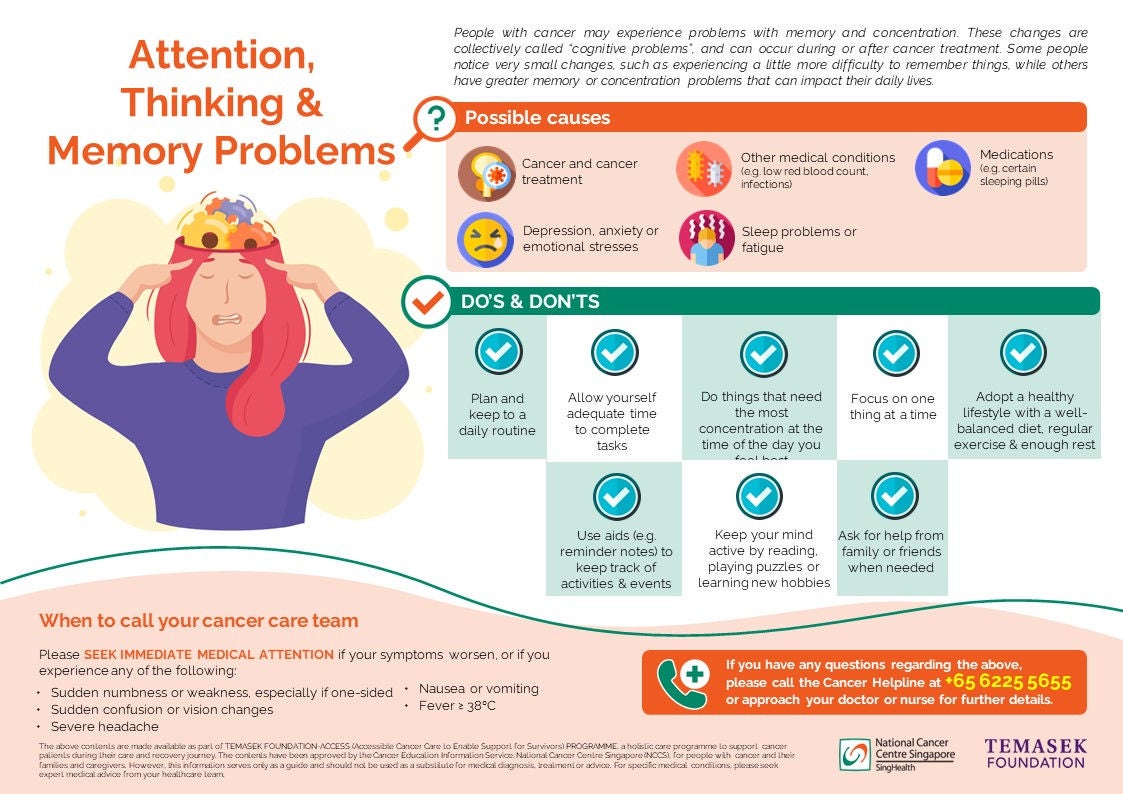National Cancer Centre Singapore will NEVER ask you to transfer money over a call. If in doubt, call the 24/7 ScamShield helpline at 1799, or visit the ScamShield website at www.scamshield.gov.sg.
Attention, Thinking and Memory Problems
- Allergies
- Appetite Loss
- Bone Problems
- Breathing Problems
- Constipation
- Diarrhoea
- Difficulty Swallowing (Dysphagia)
- Dry Mouth (Xerostomia)
- Difficulty Sleeping (Insomnia)
- Feeling Tired (Fatigue)
- Fevers and Infections
- Hair Loss
- Heart Problems
- Menopausal Symptoms
- Indigestion
- Joint Pains
- Limb Swelling (Lymphedema)
- Muscle Aches
- Nail Changes
- Nausea and Vomiting
- Pain
- Tingling or Numbness in Hands or Feet (Peripheral Neuropathy)
- Skin Changes
- Sore Mouth (Oral Mucositis)
- Taste Changes

People with cancer may experience problems with mental tasks related to their attention span, thinking or memory. These mental changes are collectively called “cognitive problems”, and can occur at any time during or after cancer treatment. Some people notice very small changes, such as experiencing a little more difficulty remembering things, while others have greater memory or concentration problems that can impact their daily lives.
Causes of Cognitive Problems
The exact cause of cognitive problems is not always known, and may be due to a combination of factors, such as:
- Chemotherapy
- Radiation therapy (particularly to the brain)
- Brain surgery or cancer involving the brain
- Hormonal treatments or hormonal changes
- Medications (e.g. steroids, anaesthetic drugs, anti-nausea drugs, analgesic drugs)
- Low red blood counts
- Sleep problems or tiredness
- Infection
- Electrolyte imbalances
- Depression, anxiety or other emotional stresses
What you need to look out for
Some examples of cognitive problems are:
- Short attention span
- Difficulty concentrating on a single task
- Problems with remembering details of recent events
- Feeling fatigued or mentally “slower” than usual
- Confusing dates of appointments
- Misplacing objects
- Fumbling for the right word or phrase
How it can be treated
For conditions that can be treated (e.g. infection, electrolyte imbalances), cognitive problems should go away after the condition is treated. Cognitive problems related to cancer treatments like chemotherapy or radiation therapy may improve or go away but unfortunately can also be long term. Your healthcare team may treat them by:
- Providing practical advice to cope with your day to day activities
- Prescribing medications such as cognition-enhancing drugs on a case by case basis
- Referring you to a cognitive rehabilitation program
What you can do
While cognitive problems related to cancer and its treatment may not be preventable, the following tips may help you cope better:
|
|
Exercise your body and mind
|
|
Get help to remember things
|
|
Seek help from others
|
|
When to call your cancer care team
It is important to identify the causes of cognitive problems because many can be treated quickly and effectively. Please inform your doctor or nurse as soon as you notice any cognitive problems as mentioned above, or if your symptoms worsen.
If you have any questions regarding the above, please call the Cancer Helpline at +65 6225 5655 or approach your doctor or nurse for further details.
Click here to download the PDF version of this article.
如果您要下载本文的中文版本,请点击此处。
Klik di sini untuk memuat turun versi PDF artikel ini.
The above contents are made available as part of TEMASEK FOUNDATION-ACCESS (Accessible Cancer Care to Enable Support for Survivors) PROGRAMME, a holistic care programme to support cancer patients during their care and recovery journey.
The contents have been approved by the Cancer Education Information Service, National Cancer Centre Singapore (NCCS), for people with cancer and their families and caregivers. However, this information serves only as a guide and should not be used as a substitute for medical diagnosis, treatment or advice. For specific medical conditions, please seek expert medical advice from your healthcare team.
Brought to you by:
![]()
![]()
Keep Healthy With
© 2025 SingHealth Group. All Rights Reserved.

















